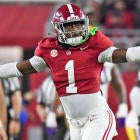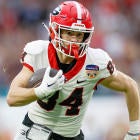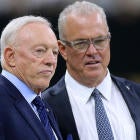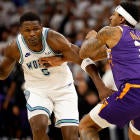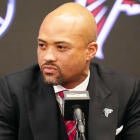One of the 13 Iowa football players hospitalized in 2011 after an offseason workout has filed a lawsuit against the school.
William Lowe, a reserve cornerback for the Hawkeyes, says the team was negligent in "developing and implementing a dangerous improper training program." He alleges that coaches and trainers failed to properly supervise him during the now-infamous workout on Jan. 20, 2011 and failed to offer care after he and others reported first pain and symptoms.
Lowe and 12 others were diagnosed with exertional rhabdomyolysis, the result of muscles breaking down and releasing proteins into the bloodstream, after checking into the hospital on Jan. 24, 2011. After the "rhabdo" outbreak, Iowa formed an investigative committee that made recommendations to avoid the issue in the future.
The Associated Press included details of the now-banned workout and its affects on Lowe and others.
The workout was only held about once every three years as a test of physical stamina, mental toughness and to see who "wanted to be on the team," according to an investigative committee report commissioned by the school.
The most grueling part were the 100 back squats players were asked to do at 50 percent of their most recent personal best. A study by University of Iowa doctors published last year concluded that those back squats were "significantly associated" with an increased risk of rhabdomyolysis — with the affected players more likely to think they could complete the untimed workout despite muscle failure.
Lowe alleges in his lawsuit that he and others reported "substantial leg pain and stiffness as well as abnormally dark urine" after that workout and fatigue that was atypical. Despite such reports, Lowe says he and the others were required to participate in a mandatory intensive workout the next day focusing on their upper body muscles.
Hawkeyes head coach Kirk Ferentz told reporters at the start of spring practice in March 2011 that all of the hospitalized players had been medically cleared to return, but Lowe never rejoined the team. The school's investigation of the incident cleared the players, coaches and trainers of any wrongdoing, determining that the injuries were the "unintentional."













